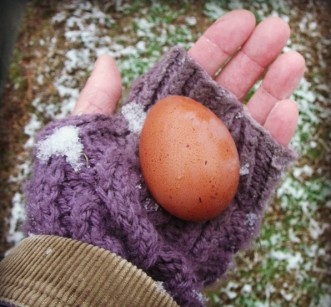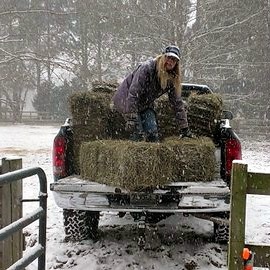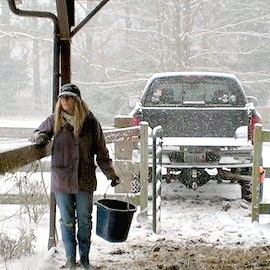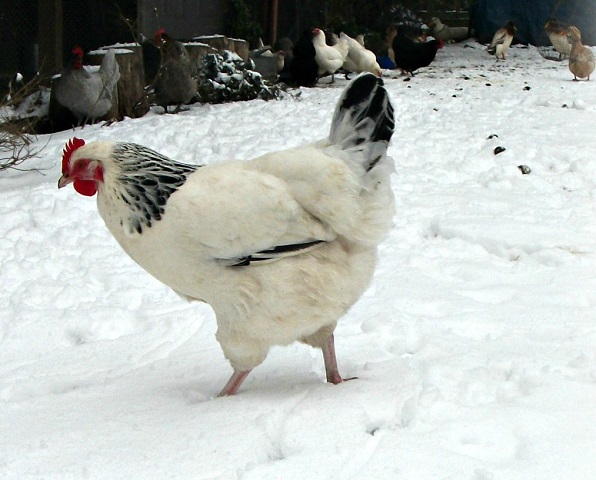Welcome back to RamZone’s Year of the Farmer guest blogger series, where stories of life on the American farm are offered up by the people most qualified to tell them—American farmers. The goal of the series, of course, is to raise awareness during the Year of the Farmer of the values, ideals and simple pleasures associated with the farming life.
Last month, guest blogger Debbie Lyons-Blythe advised her fellow farmers to join the online conversation with consumers regarding how our food is grown. This month, returning blogger Lisa Steele looks ahead to winter, reflecting on the challenges—and rewards—the harshest of the four seasons brings to life on the farm.
 Winter Challenges on the Farm
Winter Challenges on the Farm
By Lisa Steele*
As I lie in bed in our still-dark bedroom in the pre-dawn hours of a winter morning, listening to the sleet pinging against the bedroom window, I can picture the pasture blanketed with several inches of snow that fell overnight. I roll over and fall back asleep, glad that it’s the weekend and I can slumber a bit longer under the warmth of our down quilt … and then I wake up and am jerked back to reality. I was having a dream. Oh, the sleet and snow were real all right, but sleeping in isn’t an option when you live on a farm. On a farm there are no snow days, no sick days, no holidays.
Regardless of the weather, animals still need to be let out and fed and watered. Tending to a farm in the winter is made more difficult by frozen water lines, freezing water buckets and an icy, treacherous walk from the house to the barn. Paths need to be shoveled and buckets of warm water filled in the bathtub and then carried down to the barn several times a day.
 Since there’s no grass to eat, our horses rely on a steady diet of baled hay in addition to their sweet feed. The chickens and ducks too need extra feed and scratch to keep warm and nourished through the winter months. With mittened hands, I trudge down to the chicken coop to collect eggs several times a day so they don’t freeze and crack before I get them back to the house. I cajole unwilling chickens out into the pen for some fresh air, and we end up with two dogs and a cat stuck in the house all day instead of playing outside as they do in nicer weather.
Since there’s no grass to eat, our horses rely on a steady diet of baled hay in addition to their sweet feed. The chickens and ducks too need extra feed and scratch to keep warm and nourished through the winter months. With mittened hands, I trudge down to the chicken coop to collect eggs several times a day so they don’t freeze and crack before I get them back to the house. I cajole unwilling chickens out into the pen for some fresh air, and we end up with two dogs and a cat stuck in the house all day instead of playing outside as they do in nicer weather.
While animals are pretty adept at staying warm with their heavy fur coats or new feathers fresh from their fall molt, they still appreciate a nice, dry, draft-free stall or coop to sleep in. Year-round, we make feed-store runs for shavings and straw bedding. Cleaning the stalls and coop aren’t jobs I look forward to when it’s cold, but farm chores always need to be done.
 Still, I wouldn’t trade farm living for anything. Granted, we only spend as much time outside in the winter as we have to, but all through the spring, summer and fall, we enjoy peaceful country living – spending our days watching our horses graze, chickens scratch for bugs and ducks splash in their pool. We grow our own vegetables and herbs, and of course we always have a basket of fresh eggs on the counter. I love cooking with fresh ingredients—they truly are the fruits of our labor.
Still, I wouldn’t trade farm living for anything. Granted, we only spend as much time outside in the winter as we have to, but all through the spring, summer and fall, we enjoy peaceful country living – spending our days watching our horses graze, chickens scratch for bugs and ducks splash in their pool. We grow our own vegetables and herbs, and of course we always have a basket of fresh eggs on the counter. I love cooking with fresh ingredients—they truly are the fruits of our labor.
There is such a sense of accomplishment that comes from working your own land and raising animals. Although they can’t express it the same way humans do, I know our animals are grateful for every bucket of water we carry and every bale of hay we unload into the barn. Sometimes an unspoken thank you is the most powerful. All our animals pay us back a thousand-fold just with their companionship, but in addition, the horses keep our property “mowed,” our dogs provide a built-in home security system and watch for predators, our cat rids the barn of field mice, and our chickens and ducks lay us delicious eggs and act as natural garden fertilizers and pesticides. Everyone pulls their weight on a farm the best way they know how. And we’re merely doing our part hauling those buckets of water through the snow.
Lisa can be found regularly blogging about life on the farm at Fresh Eggs Daily.
*This guest blogger was compensated by Ram Trucks.























